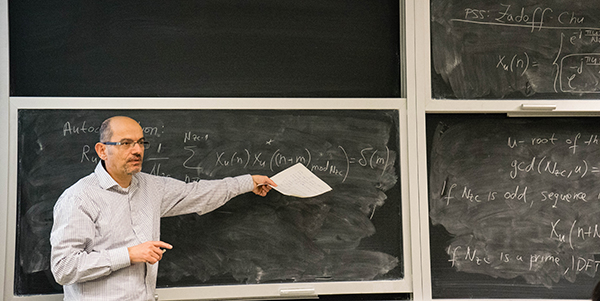
April 11, 2018
Laura Brown
The Master of Engineering Program (MEng) in The Edward S. Rogers Sr. Department of Electrical & Computer Engineering (ECE) fosters ongoing connections between academia and industry with the help of lecturers who are living in both worlds.
Students are taught by a number of successful industry professionals with both expertise and experience in their fields — the MEng program prepares graduate students for advanced practice in a number of electrical and computer engineering areas of specialization. Students can complete their MEng degree in just one year of full-time study, or over two or more years in the extended full-time or part-time option.
In addition to full-time positions in industry, Dr. Ivo Maljević (ECE PhD 0T4), Senior Member of Technology Strategy at Telus, and Dr. Ihab Amer, Fellow at AMD, are lecturers in the MEng Program at ECE. They are just two of five MEng instructors whose full-time positions in industry give their students a unique practice-focused perspective.
“I was looking for courses taught by professors who were also working in the industry,” says Ronald Rodriguez Lira (ECE MEng 1T5). “They bring a lot of experience, knowledge and a unique perspective to the courses.”
Topics that are of great interest to industry, like the next generation of wireless technologies, are top of mind for MEng instructors. In his course entitled Mobile Broadband Radio Access Network, Maljević covers mobile broadband communications systems, teaching students important aspects of modern mobile networks, including the industry’s evolution towards 5G. “Throughout the semester, we cover current industry standards and initiatives,” says Maljević. “The course also explores how vendors and operators deploy networks and develop their products — so students get a better understanding of why the theory applies and how it applies to certain situations.” says Maljević.
Amer also designs his courses with real-world applications in mind. His first course introduced his students to the concept of design trade-offs, wherein a design must be justified from many different angles such as use-case, cost and market pressures. Having left academia to enter industry only six years ago, Amer knows that acquainting his students with these unique industrial challenges teaches them qualities that are highly desired in the workforce.
“Our MEng instructors have a strong technical background and experience in industry that provide students with a unique lens through which they can view the course material,” says Professor Frank Kschischang, Associate Chair, Graduate Studies in ECE. “They deliver high-quality courses and offer not only academic expertise in their areas but the business and industrial considerations too.”
MEng students also have access to important career connections: both Amer and Maljevic provide insight about their own companies and career paths. As well, Maljević invites industry professionals to give lectures during his courses so that students are able to mingle and network with them. Though, students don’t have to look to just the front of the class for networking opportunities: they can also look to their classmates beside them. “I was able to meet fellow students who were working full-time in the field while taking MEng courses in the evening,” says Lira. “I could ask them for advice and hear about opportunities in their workplaces that I might not otherwise have known about.”
The MEng program offers a mix of the technical, leadership and business competencies required to accelerate students’ careers. Maljević highlighted the flexibility of the MEng program as one of his many reasons why he loves to teach. Juggling work and school can be challenging, for instructors and students. But for Maljević, it’s worth it: “I get the best of both worlds.”
More information:
Laura Brown
Event Planning & Communications Assistant
The Edward S. Rogers Sr. Department of Electrical & Computer Engineering
416-978-1999; lr.brown@utoronto.ca